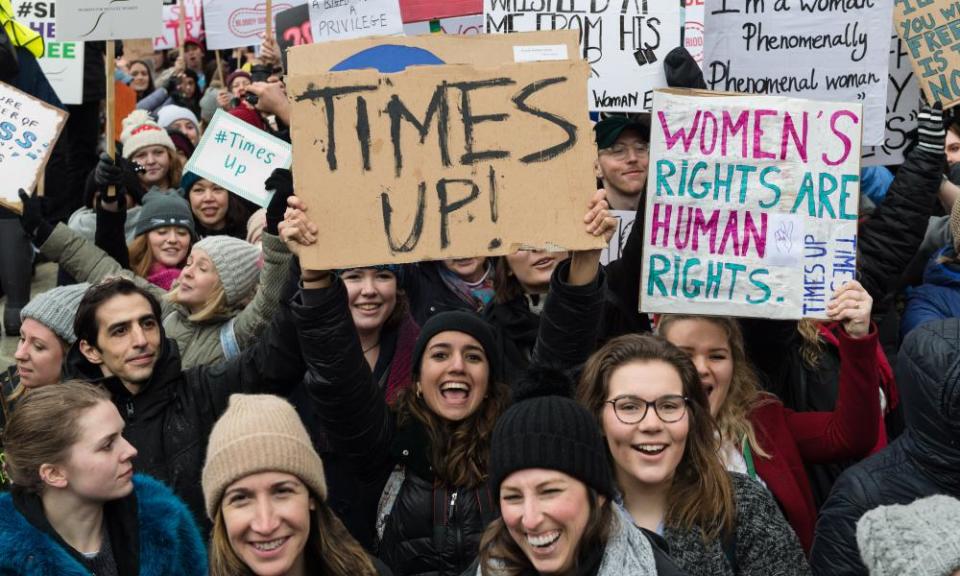The Time’s Up rally showed you can be both a trans ally and a feminist

Photograph: Szymanowicz/Rex/Shutterstock
In sleet and rain, opposite 10 Downing Street on Sunday, I stood in a crowd cheering Britain’s most revered feminists as they took the stage one by one. There was Helen Pankhurst, activist and granddaughter of Emmeline, who spoke about how far we’ve come in 100 years since women’s partial suffrage, Phyll Opoku-Gyimah, the lesbian founder of UK Black Pride, and Stella Creasy, the MP for Walthamstow.
One of the biggest cheers however, was reserved for Paris Lees, transgender journalist and campaigner. “I’m here for the same reason a lot of you are here: because we need each other,” said Lees. “Every woman counts. Every woman deserves to be safe. Every woman deserves to live her life without limit. And we leave no one behind.”
As heartening as it was to see Lees warmly welcomed by the crowd of thousands, what was less heartening was to hear that she was nervous to take to the stage, given a recent climate of transphobia in Britain. Privately, Lees later told me she was scared of having eggs thrown at her.
Transgender Labour women’s officer Lily Madigan voiced similar concerns about attending the march on Twitter: “I should … be able to go on a women’s march without being threatened and feeling unsafe, and I absolutely should not have to defend my gender to the point of tears most days!” she wrote on Sunday.
We need to include trans women in our gendered spaces and at protests, because they are at high risk of violence
The attacks Lees and Madigan are referring to have played out not just in tabloids, or the dark recesses of the internet, but in Britain’s biggest newspapers. In late 2017, some compared being transgender to having a mental illness (although it was declassified as such in 2012). Others peddled the myth that children in Britain are being encouraged to transition (they can’t, you have to be over 18). And then there was another debate, one that continues to leave many of my cisgender (meaning “not trans”) friends on the fence. It centres on gendered spaces such as women’s toilets and changing rooms. If we let trans women into these spaces, goes the argument – made by Labour MP Caroline Flint – doesn’t that mean we have to let men in, too, putting women’s safety at risk?
For months I’ve felt betrayed by this type of rhetoric and sick of seeing feminism used as a stick to beat trans women with. The gendered spaces debate, while confusing to some, is founded more in moral panic than evidence. In countries such as Malta, Argentina, Denmark and Ireland, where trans people can self determine their legal gender and therefore use gendered spaces of their choosing, there is no proof that there have been any problems or dangers to women. (It is a similar bill being proposed in the UK that has sparked a lot of these arguments around gendered spaces). While I identify as a gay woman, I’m also a cis woman who uses gendered spaces, meaning I understand the anxiety about, for example, men being in women’s toilets, and that it could feel predatory or invasive. Let’s not forget that 2017 was also the year of #MeToo.
Furthermore, there is no evidence to suggest that trans people are likely to commit a violent crime, so why are we using these people – a group already at the bottom of the ladder in terms of social equality – as the thin end of the wedge in a conversation about toxic masculinity and rape culture?
If anything, I think we need to include trans women in our gendered spaces and at protests against sexual harassment, such as Sunday’s rally, because they are at high risk of violence. According to new research from LGBT charity Stonewall, one in eight trans people have experienced violence at work. Similarly, a US survey found that 47% of trans women have been sexually assaulted in their lifetime.
It’s for these reasons that the organisers of the Time’s Up rally (the same group which organised last year’s Women’s March in London) asked Lees to take part, along with nonbinary activist Maria Munir and several other transgender spokespeople whom I’m told could not make the event (or perhaps did not feel safe to).
“What Paris was saying was brilliant because it resonated so much,” says Rachel Krengel, one of the organisers. “She was saying that we all experience the same things under the patriarchy, even if that manifests differently. There’s been an appalling level of transphobia in the media and on social media lately, but it shouldn’t be a question of ‘why would you include a trans speaker?’ – to have something like the Women’s March and not include a trans woman would be offensive. It’s sad it’s even a question in 2018.”
Hearing Krengel’s words and the crowd’s cheers on Sunday gave me hope that this year will be a better one than last for the inclusion of trans women in cis women’s conversations about social inequality. Cis women and trans women both know what it’s like to suffer scrutiny over your body image, what it’s like to face discrimination and a pay gap at work, and what it means to experience sexual violence. Really, we could have so much more to talk about than toilets.
• Amelia Abraham is a freelance journalist writing on music, film and identity politics

 Yahoo News
Yahoo News 